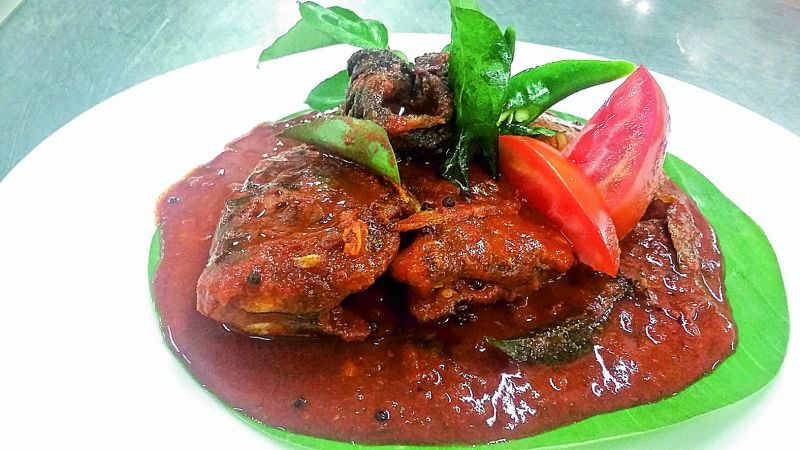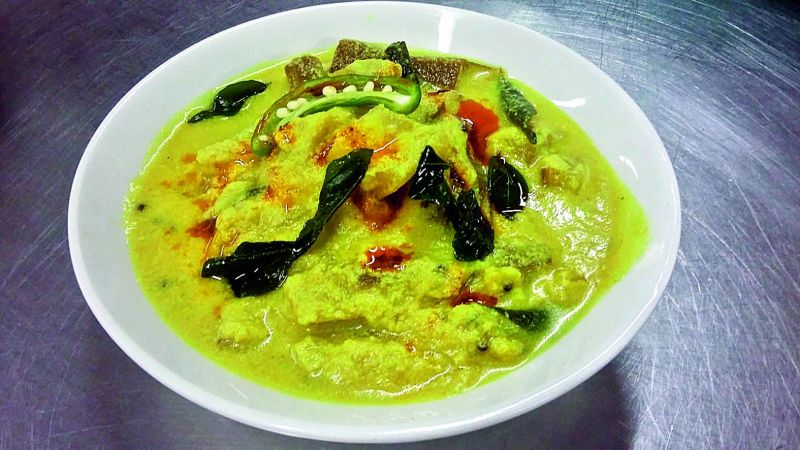Traditional flavours from grandma's kitchen

Pidiyum irachiyum’ literally means chicken with rice dumplings. It is one of the traditional dishes of Syrian Christian community in Kerala. Its origin dates back to 4th century, where a group of Christians under the leadership of Thomas of Knanay (Knanayi Thomman) arrived at Muziris Port. They were warmly welcomed by the King of Venad with 72 rights. The local people treated them with the Hindu community delicacies kozhukkatta (rice dumplings). As the guests were non-vegetarians, the chieftain asked the hosts to cook some meat dish for them.
The delicious dish later went on to become a upper caste privilege. The migrated community introduced the dish to Central and Northern Kerala in a variety of tastes. Pidi (dumpling) can be served separately with meat dish or can be cooked together with the curry. A complete meal, it is very popular in Central Travancore and Malabar regions of Kerala.
When I tasted this wonderful dish for the first time at an ancestral Syrian Christian home, the 85-year-old grandma there sporting the traditional attire mundum chattayum (traditional Kerala Christian woman attire of a white dhoti artistically folded in the back and a white long blouse) was more than happy to share with me the story behind the dish. A compete meal by itself, pidiyum irachiyum can be served as any meal of the day. It is also an offering on auspicious days of Christian religious festivals. There are two other dishes — meen thekathiyathu and charu curry — cooked in the traditional manner and are unfortunately, vanishing as generations progress.
Pidiyum irachiyum (Rice dumplings and meat dish)
Ingredients For Pidi
Roasted rice flour - 1 cup
Cumin - 1/4 tsp
Grated coconut - 1/4 cup
Shallots - 4-5 nos
Salt - To taste
Hot water - 1 cup
Method
Grind coarsely the shallots and cumin together.
Mix it with rice flour and grated coconut.
Add salt and mix it with hot water to make a soft dough.
Divide the dough into small balls and flatten using palms.
Steam it in an idli steamer and keep aside.
Ingredients
For meat curry
Beef - 1 kg
Ginger - 50 gms
Garlic - 50 gms
Shallots - 100 gms
Onion - 150 gms
Tomato - 150 gms
Green chillies - 4-5 nos
Curry leaves - 2 sprigs
Mustard - 1 tsp
Turmeric powder - 1 tsp
Red chilli powder - 3 tsp
Coriander powder - 3 tsp
Garam masala powder - 1.5 tsp
Grated coconut - 1cup
Fennel seeds - 1/2 tsp
Coconut milk - 1 cup
Coconut oil - 1/2 cup
Salt - To taste
Tempering
Coconut oil - 1 tbsp
Chopped shallots - 1tbsp
Curry leaves - 1 sprig
Whole red chilli broken - 2 nos
Method
Clean, wash and cut the beef into medium pieces.
Cook it in a pressure cooker with crushed ginger, garlic, ½ tsp turmeric, 1 tsp chilli powder, curry leaves, salt and sliced onions.
Heat one tsp of oil in a pan and roast the coconut with fennel until it turns light golden in colour.
Remove from fire and grind it and keep aside.
Heat oil, splutter mustard, curry leaves.
Saute the remaining chopped ginger and garlic. Add chopped green chillies and sliced shallots, saute till brown in colour.
Add all dry spices, saute for a while and add chopped tomatoes.
Cook it till all the ingredients are mashed up.
Add the cooked beef and ground coconut with one cup of warm water and simmer.
Add the cooked rice pidi into the meat curry along with the coconut milk. Check the seasoning; simmer for a while till the gravy thickens.
Remove from the fire.
Tempering
Heat oil, add curry leaves, red chilli and shallots, fry well and add to the curry.
Close the pot and keep for a while. Serve hot .
Meen thekathiyathu (Fish cooked in traditional way)
Ingredients
Pearlspot fish - 500 gms
Ginger - 15 gms
Garlic - 15 gms
Fenugreek seeds - 1 tsp
Sliced onions - 1 cup
Green chilli - 3-4 nos
Turmeric powder - 11/2 tsp
Chilli powder - 2 tsp
Coconut oil - 3 tbsp
Mustard seeds - 1/2 tsp
Raw mango - 25 gms
Coconut milk - 1/2 cup
Malabar tamarind - 2 pc
Red chilli broken - 2 nos
Curry leaves - 1 sprig
Shallots chopped - 1tsp
Salt - To taste

Method
Clean, wash and drain the pearlspot fish.
Heat 2 tbsp coconut oil in a pan, splutter methi seeds, saute juliennes of ginger, garlic and chopped chilli.
Add the sliced onions and fry well. Add turmeric, chilli powder, soaked Malabar tamarind and mango pieces with a cup of water. Simmer and add the fish.
Add salt, cover with a banana leaf and simmer in a low flame till the fish is cooked, add coconut milk, mix lightly and remove from fire.
Tempering
Heat one tbsp oil in a pan, splutter mustard seeds, add chopped shallots, curry leaves and broken red chillies.
Fry well and add to the curry and cover. Serve hot with rice.
Charu curry (Seasonal vegetable curry)
Ingredients
Curry cucumber - 100 gms
Drumstick - 100 gms
Jackfruit seeds - 100 gms
Mango - 100 gms
Grated coconut - 1 cup
Shallots - 50 gms
Garlic - 1 pod
Cumin - 1/2 tsp
Turmeric - 1 tsp
Curd - 1/2 cup
Salt - To taste

Method
Peel and cut the cucumber into dices, cut the mango into dices.
Peel and quarter the jackfruit seeds, cut the drumstick into finger size. Boil all the vegetables with two cups water, salt and turmeric till half done.
Grind the coconut with turmeric, shallots, garlic and cumin into a smooth paste. Add this paste to the curry and simmer, add beaten curd, mix well, heat it and remove from fire.
Tempering
Heat one tsp oil in pan. Add mustard seeds, curry leaves, chopped shallots and red chillies.
Fry well and add to the curry. Serve hot with rice.
Chef Soju Philip, executive chef Ramada Resorts Kochi

